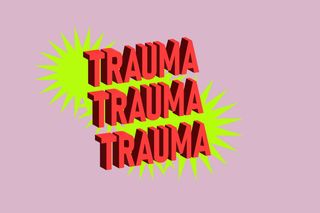
Words Mean Things: ‘Trauma’
The problem, it would seem, is the lack of sufficient vocabulary to simply encapsulate the struggles of living in a difficult world.

In Words Mean Things, we unpack weighty words whose meanings have been sacrificed to hot takes.
Last year, Vox called ‘trauma’ the word of the decade. And it may well be — it’s ubiquitous on the internet, appearing simultaneously in earnest conversations about surviving trauma, and in irony-poisoned jokes about everything being trauma. And it’s a superbly versatile term. Influencers — whether qualified to do so or not — fill up social media timelines with ahistorical lists of what a trauma response looks like. Others often draw boundaries by asking their mutuals or acquaintances not to “trauma dump” when they’re the recipient of emotional burdens. Many even rush in to designate other people’s trauma as “valid” (another word co-occurring with trauma talk). It’s also collective, intergenerational, and cultural.
The DSM defines trauma as “actual or threatened death, serious injury, or sexual violence,” though many have pointed out for a while that strictly technical definitions can be limiting, and not capture the range of human experiences that have a deeply damaging impact on us. Take the fact that there was a protracted battle to recognize domestic violence survivors as legitimate claimants to a post-traumatic stress disorder (PTSD) diagnosis, previously only reserved for war veterans.
However, the slow and steady expansion of the term’s boundaries have resulted in the term being left completely unbounded. “‘I have trauma,’ just becomes like, ‘I’m depressed’ or, ‘I’m addicted to cookies,’” Pamela Rutledge, a media psychologist, told Vox. Take the “trauma-sensitive” yoga instructor who spoke about having “hair trauma” from growing up with frizzy hair, or the Emory students who were allegedly traumatized by seeing “Trump 2016” written in chalk in public. Even the more recent “West Elm Caleb” phenomenon — in which a 25-year-old man was found serially cheating on and ghosting many women — elicited the accusation of causing such pain, that his “victims” shared trauma. With infidelity, offensive language, the list goes on, prompting New York Times editor Jessica Bennet to ask: if everything is trauma, is anything?
In the post-pandemic context, the word gained greater currency. “When people say the pandemic has been a collective trauma, I say, absolutely not,” Bessel van der Kolk, author of the bestselling book The Body Keeps the Score, told The Atlantic.
Related on The Swaddle:
Repeated Exposure to Trauma Does Not Make People Stronger, Shows New Study
Is there an objective measure of trauma? There are many uncertainties that make it such a slippery term: is trauma in the event that took place, or in a feeling the individual develops over time in response to something less tangible? There’s a list of situations that officially count as traumatizing in the DSM: in volume III, the number stood at 14; in volume IV, it rose to 19. But many began expressing concern at the rapidly expanding definitions: could this risk erasing the differences between PTSD and depression, anxiety, or otherwise equate catastrophic events with more ambiguous forms of suffering? Arguably yes — and some argue that our propensity to call something trauma when it isn’t could become a self-fulfilling prophecy, wherein we do end up feeling symptoms of trauma. As Nick Haslam, a professor of psychology at the University of Melbourne noted, “When an affliction is seen as traumatic, it becomes something overwhelming — something that breaks us, that is likely to produce post-traumatic symptoms and that requires professional intervention.” Halsam coined the term “trauma-creep” to describe the way clinical language is employed to speak about common — though unpleasant or even momentarily harmful — experiences. It could, however, be an overreaction to a culture immune to recognizing certain kinds of pain or adversities as legitimately bad.
Even the symptoms aren’t as clear-cut, prompting the oft-used assurance that trauma looks different for everyone, but is equally valid. All that’s required to qualify as someone with trauma, it would seem, is a self-proclamation of it. On #Traumatok, a trending hashtag on TikTok, are various lists of symptoms like inability to stop scrolling, decision fatigue, and overanalyzing are enumerated as trauma responses.
The democratization of trauma, facilitated by the internet, has led to the proliferation of a specific sub-genre of memes: trauma memes. On the one hand, experts say it helps survivors of trauma form a community of support to destigmatize it. For others, it’s a sign of the “Buzzfeed-ification of mental health.”
As a result of this overuse: “Trauma started to become an easy go-to narrative for mental health challenges,” said Janis Whitlock. The idea is that there is no hierarchy when it comes to pain, and that some pain is not greater than something else based solely on the instigating event(s). But if this were true, we would have fewer caveats along the lines of “of course, this is in no way comparable to…” in many descriptions of trauma.
The problem, it would seem, is the lack of sufficient vocabulary to simply encapsulate the struggles of living in a difficult world. It’s a shocking, vulnerable time to be alive, with multiple crises fraying nerves all at once. Systemic issues cause real hardships — exclusion, unemployment, burnout, depression, or any other experience that is hard to cope with. This is why trauma feels easier to describe what this all feels like: it lends itself to the gravity we may want to convey about how we feel.
And it’s an all too human sentiment — the impulse to call every difficulty trauma shows an inherent vulnerability of needing those difficulties acknowledged. But the alienation of modern day life precludes that acknowledgement — arguably, leading us to borrow from language to force it.
Rohitha Naraharisetty is a Senior Associate Editor at The Swaddle. She writes about the intersection of gender, caste, social movements, and pop culture. She can be found on Instagram at @rohitha_97 or on Twitter at @romimacaronii.
Related


A New Genre of Indian Entertainment Wants to Look Politically Edgy, But Ends Up Being Inherently Apolitical
